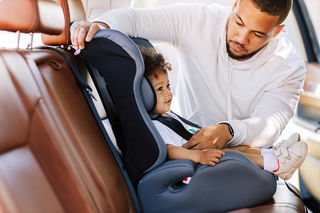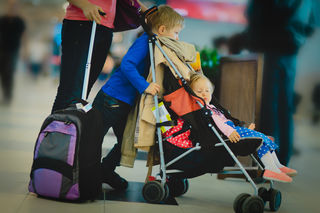Sleep
Travel and Toddlers and Tantrums, Oh My!
Tips for surviving, and maybe even enjoying, family vacations.
Posted December 17, 2019

Whether by plane, train, or automobile, on trips ranging from two days to two weeks, young children may be apt to have a tough time (read: throw more or worse tantrums).
Traveling, by definition, means a complete change in surroundings, often from the familiar to the (at least relatively) unfamiliar.
There may or may not be a time change, and time changes alone are often sufficient to throw a whole family system out of whack. On top of this, parents frequently experience a kind of low-level yet pervasive nervousness for the duration of the trip. They’re either “on guard” for unpredictable travel incidents or worried about how various aspects of the trip will play out. Will the hotel mattress be decent? Will my mother-in-law have her usual unrealistic expectations about how my kids should behave?

For these and other reasons, young children can experience travel and time away from home as disorienting or even upsetting. You know that making sure you have everyone’s boarding passes is more important than digging a granola bar out of your bag, but from your toddler’s perspective, you’re just distracted, exasperated, and way less responsive to his snacking needs than usual. As with everything, there are vast individual differences here. Yet, I have found that even the most adventuresome, flexible little ones often have more tantrums during and in the wake of time away. How to handle this?
- Before you leave, let your child know what to expect and what’s going to happen when. Maybe even make a simple picture book with drawings or photos (nothing fancy) that maps this out day by day.
- Similarly, review social and behavioral expectations in advance, as specifically as possible. For example, "The house we are renting will have a pool. It is very important that you not go near the pool unless a grown-up is there." Or, "Aunt Doris will ask you for a hug. It is OK not to hug her if you don’t want to. Let’s talk about what you can say or do instead."
- To the extent possible, keep up your child’s usual schedule and routines. Can you get him the same breakfast cereal to eat in the morning? Bring her own sheet to put on the mattress? (Along the lines of sleep, consider adding a white noise machine and paper black-out shades to your packing list.) Still FaceTime the grandparents on Sunday? Read some of the same books at bedtime? (Books are heavy to pack, but lugging a few favorites is 100% worth it so that you can replicate the bedtime routine you do at home as closely as possible.)
- On the flip side, embrace the change; we call vacations “getaways” for a reason. Help your kids enjoy the change in your daily routine. Point out the different kinds of flowers and trees that don’t grow where you live. Giggle about Grandpa’s photos of you at prom. And be gentle with yourself about “slippage”: Your child may have more screen time or sugar than she’d have at home, and that’s OK.
- Be conscious of how you schedule and spend your days. If this sounds a bit vague, it’s because I can’t provide a formula; it all depends on your family’s preferences. Some children and families do better with more activity and less unstructured time. Other children and families do better with more downtime and fewer set plans. The point is to be thoughtful about how you balance both activity/structure and downtime and to consider not only your own but also your children’s needs in this regard.
- Remember to connect to your little ones consciously and intentionally. Again, while you’re keeping track of logistics and making plans so that that the time away is a success, your little one may be experiencing you as distracted, nervous, exasperated, or all three. Anticipate this, and make sure to find time to devote yourself fully to your child, doing whatever it is that she wants to do. If that’s staring at the lizard on the wall for what seems like an inordinately long period of time, then so it goes. (Our family went on a tropical vacation a year ago, and this was a favorite pastime for my boys.)
-
After your return, it’s likely your little one will be exhausted, both physically and emotionally. This is key to remember not only in the hours immediately after you get home, but also in the days (and sometimes even weeks) that follow. Parents often see an increase in tantrums during this time. Be understanding and compassionate about this, bringing on the hugs and cuddles, while also prioritizing getting back into typical routines as quickly and seamlessly as possible. Let your little one know that you get it: “Going away and then coming home again is exhausting, right?” If his or her emotions continue to seem all over the place following time away, consider making a book about the trip or just spend some time describing the various events in the order they unfolded. You can highlight fun memories and look at the pictures you took. In doing so, you are helping your child organize his or her experiences, which little brains can’t always do by themselves at this stage.
Bon voyage, parents everywhere!
References
Excerpted from The Tantrum Survival Guide, Rebecca Schrag Hershberg, 2018. Copyright Guilford Press. Reprinted with permission of The Guilford Press.


